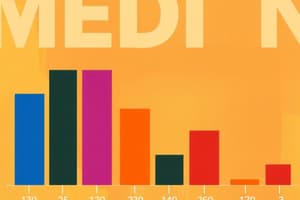Podcast
Questions and Answers
What are the two most common measures of center?
What are the two most common measures of center?
- Mean, Mode
- Variance, Standard Deviation
- Mean, Median (correct)
- Mode, Range
What is the mean?
What is the mean?
The sum of the observations divided by the number of observations; the balancing point.
What does the variable 'X' represent?
What does the variable 'X' represent?
The variable we are measuring (the sample data)
What does 'n' stand for in statistics?
What does 'n' stand for in statistics?
What is denoted by 'X₁'?
What is denoted by 'X₁'?
What does 'Xn' represent?
What does 'Xn' represent?
What does '∑x' signify?
What does '∑x' signify?
What does 'x̅' refer to?
What does 'x̅' refer to?
What is the population mean?
What is the population mean?
What is a weighted mean?
What is a weighted mean?
The mean can be greatly affected by _______ in the data set.
The mean can be greatly affected by _______ in the data set.
What is the median?
What is the median?
What is the mode?
What is the mode?
What is the range?
What is the range?
The simplest measure of spread is called the _____ of the data set.
The simplest measure of spread is called the _____ of the data set.
Most common measures of variation are based on deviations from the ___________.
Most common measures of variation are based on deviations from the ___________.
What is sample deviation?
What is sample deviation?
What is the variance?
What is the variance?
What is the sample standard deviation?
What is the sample standard deviation?
What does δ represent?
What does δ represent?
What does δ² signify?
What does δ² signify?
What is Q₁?
What is Q₁?
What is Q₃?
What is Q₃?
What is the interquartile range (IQR)?
What is the interquartile range (IQR)?
What is the five-number summary?
What is the five-number summary?
What is a boxplot?
What is a boxplot?
Flashcards are hidden until you start studying
Study Notes
Measures of Center
- Mean and median are the two most common measures of center.
- Mean is the average, calculated by dividing the sum of observations by the number of observations. It acts as a balancing point in the dataset.
- Median represents the middle value of an ordered data set.
Key Variables
- X denotes the variable being measured, representing the sample data.
- n indicates sample size, which signifies the number of observations within the sample.
- X₁ is the first observation, while Xn is the last observation in the sample.
Summation and Mean Notation
- ∑x refers to the total sum of all x values in the dataset.
- x̅ (x-bar) represents the sample mean, whereas µ (mu) denotes the population mean, which is the average of all values in the population.
Types of Mean
- Weighted mean is found by multiplying each value by its corresponding weight, summing these products, and dividing by the total sum of weights.
Impact of Outliers
- Outliers can significantly affect the mean, making it less representative of the dataset.
Mode and Range
- Mode is defined as the most frequently occurring observation in the dataset.
- Range measures the spread of the dataset, calculated as the largest value minus the smallest value.
Measures of Variation
- Common measures of variation are based on deviations from the mean.
- Sample deviation is the difference between an observation and the sample mean.
- Variance quantifies the degree of spread by calculating the sum of squared deviations from the sample mean divided by (n-1).
- Sample standard deviation is the square root of the sample variance, while δ represents population standard deviation, and δ² denotes population variance.
Quartiles and Distribution
- Q₁ is the lower quartile, marking the median of the lower half of sorted data, while Q₃ is the upper quartile for the upper half.
- Interquartile range (IQR) is the difference between Q₃ and Q₁, indicating the dispersion of the middle 50% of data.
Summary and Visualization
- The five-number summary includes minimum, Q₁, median, Q₃, and maximum values.
- Boxplot visually represents the five-number summary to easily convey data distribution and detect outliers.
Studying That Suits You
Use AI to generate personalized quizzes and flashcards to suit your learning preferences.




